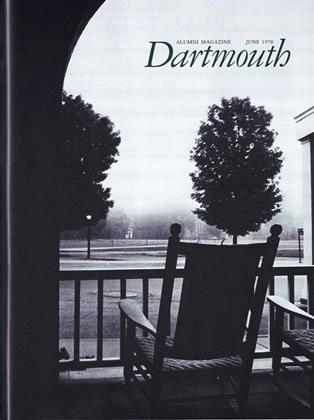Retirements these days are getting as complicated as undergraduate residence under the Dartmouth Plan. The possible variations are not quite as numerous, but they exist in bewildering array.
There's one program, marching under the ensign FRO (Flexible Retirement Option), whereby an administrator or faculty member with at least 15 years of service can ease gradually out, under a complex formula, starting at either 60 or 62 years of age. A goodly number retire "officially," but hardly break stride for the ceremonies, continuing to do on outside grants what they've been doing all along on Dartmouth salaries. Some turn up at the same old stand the following year under all manner of negotiated settlements; others just seem to keep reappearing for as many farewell bows as Sarah Bernhardt. A select group simply chooses not to discuss the matter, and among them a few actually get away with it.
Be that as it may, there comes a time in the year's occupation when we customarily pause to honor those who, by whatever route, are winding up their service to the College. More often than not, full retirement coincides roughly with a 65th birthday, but soon even that will change - by order of the U.S. Congress. This year, we present an even dozen men and women in teaching or administrative positions who, within the year, have terminated, are terminating, or will be terminating, abruptly, partially, or gradually, their duties at Dartmouth.
As different as their approach to retirement are the length of their service - eight years to 36 - and the nature of the duties they have been, are, or will be relinquishing. That very diversity reminds us once again of the astonishing range of functions of a residential college. We can't recall what president of what institution it was who bemoaned the fact that, while overseeing an educational program designed to equip a group of more or less receptive "leaders of the future" to go forth and lead, he was at the same time required to run a hotel, a hospital, a bank, a convention bureau, a golf course, an investment house, multiple restaurants, a construction and maintenance firm, a summer camping program, an arts festival, and a booking agency for cultural and sporting events.
Four faculty members retired, to a greater or lesser degree, following Commencement. The senior in point of service was Joseph Ermenc, who had been teaching engineering at Dartmouth since 1942. With him on the reviewing stand as the graduates made their progress across the Green were Elmer Harp Jr., a member of the Department of Anthropology for 32 years; E: Lucille Smith, Dartmouth's first woman full professor, who came in 1958 to teach biochemistry; and Paul Zeller, with the College since 1947, who will continue to direct the Glee Clubs for another year before he moves South.
J. Blair - officially assistant director of the Office of Instructional Services and Educational Research but better known to thousands of alumni as Dartmouth's "Mr. Film," has opted for early retirement after 33 years with the College. A brace of helpful ladies who have smoothed the path of innumerable undergraduates through bibliographical mazes - Theresa Blake, chief of reference services, and Helen G. Whyte, chief of serials, have left Baker Library after 19 and 16 years, respectively. Cashier Clayton Gould, who had been cashing students' checks since 1946 - and relieving them of their money as painlessly as possible retired several months ago for reasons of health; and Paul Romaine, who has put some of that money to use as purchasing agent for the past 11 years, puts down his invoices this month. After November, Ruth King will, for the first time since 1945, not be administering doses of tender, loving care to ailing students at Dick's House. Desmond Canavan, who came to the College in 1958 as an ROTC instructor and transferred to the Thayer School as assistant dean four years later, has relinquished his administrative duties; and Ernest Draper '35, after eight years, will let someone else keep track of Tuck School alumni.
Along with every other segment of society, Dartmouth personnel approach the end, however tentative, of their professional careers with differing emotions: some so engrossed in their jobs that they are embittered by retirement requirements; others equally capable, equally energetic, who welcome the time when they can turn attention to other, long-neglected pursuits. To them all, the ALUMNI MAGAZINE bids vale.
Elmer Harp, along with three other professors, gave his final final exam this month.
 View Full Issue
View Full Issue
More From This Issue
-
 Feature
FeatureShhh. There still are idealists abroad and they're called the Peace Corps
June 1978 By Dan Nelson -
 Feature
FeatureHonorary Degrees
June 1978 -
 Feature
FeatureThe Valedictories
June 1978 -
 Feature
FeatureFancies, Toyes and Dreames
June 1978 By Mark Hansen -
 Class Notes
Class Notes1974
June 1978 By STEPHEN D. SEVERSON -
 Article
ArticleBad Times to Big Time
June 1978








